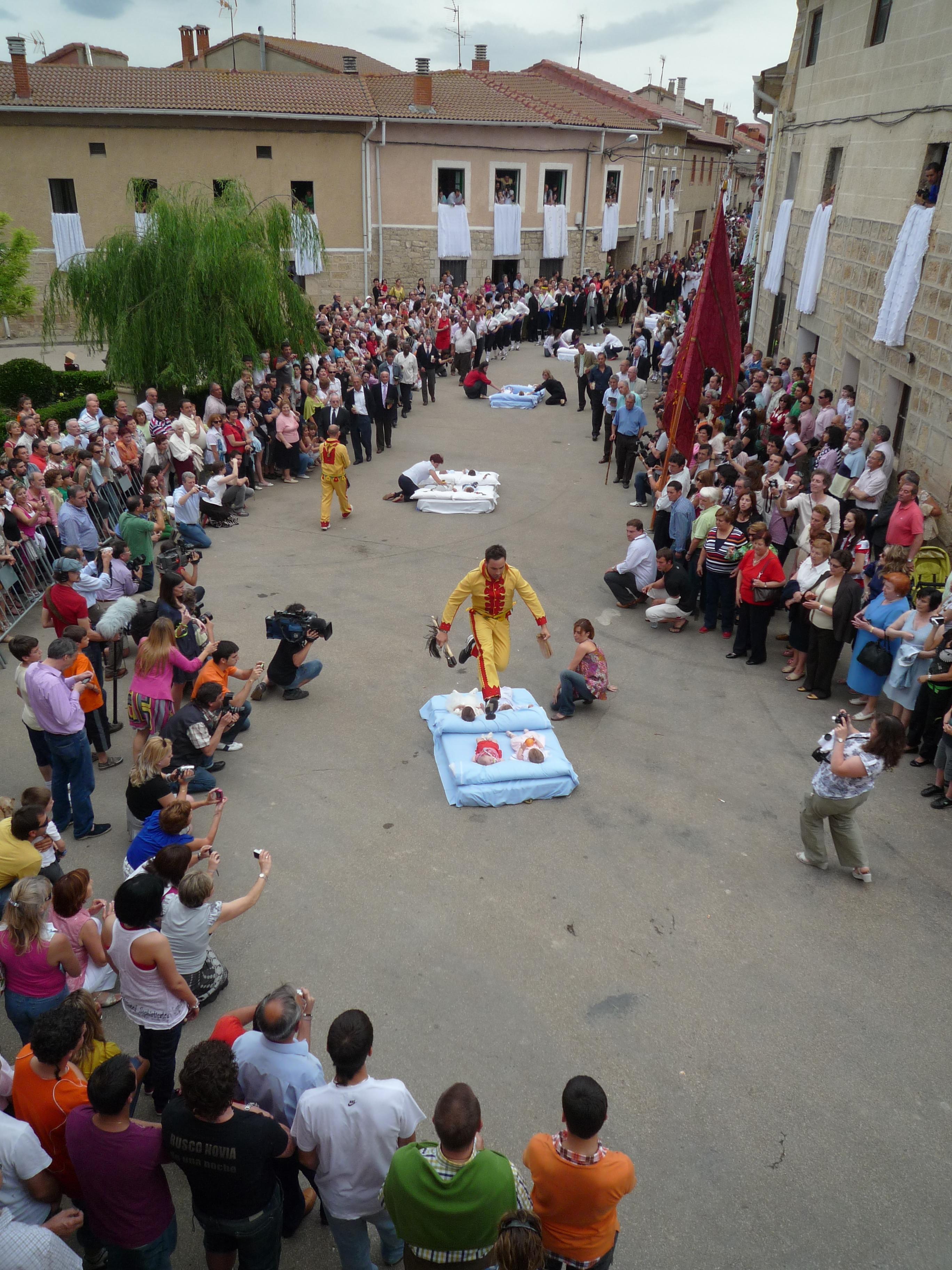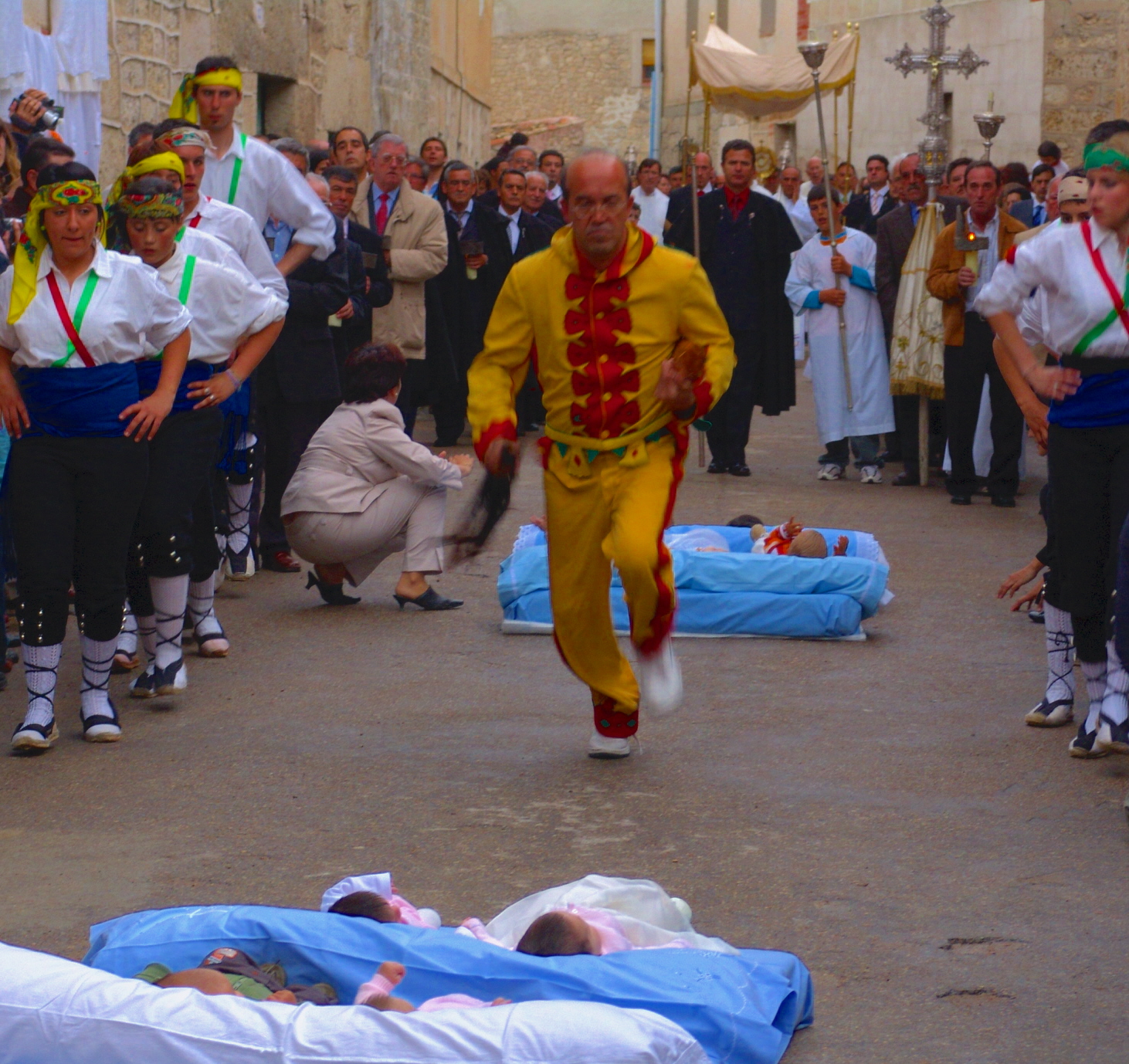El Colacho on:
[Wikipedia]
[Google]
[Amazon]

 Baby jumping (Spanish: ''El Colacho'') is a traditional Spanish festival dating back to 1620. It takes place annually to celebrate the Catholic feast of Corpus Christi in Castrillo de Murcia, a village in the municipality of
Baby jumping (Spanish: ''El Colacho'') is a traditional Spanish festival dating back to 1620. It takes place annually to celebrate the Catholic feast of Corpus Christi in Castrillo de Murcia, a village in the municipality of

 Baby jumping (Spanish: ''El Colacho'') is a traditional Spanish festival dating back to 1620. It takes place annually to celebrate the Catholic feast of Corpus Christi in Castrillo de Murcia, a village in the municipality of
Baby jumping (Spanish: ''El Colacho'') is a traditional Spanish festival dating back to 1620. It takes place annually to celebrate the Catholic feast of Corpus Christi in Castrillo de Murcia, a village in the municipality of Sasamón
Sasamón is a municipality and town located in the province of Burgos, Castile and León, Spain. According to the 2004 census (INE), the municipality has a population of 1,346 inhabitants.
During pre-Roman times, it was the capital of the Turmodi ...
in the province of Burgos
The Province of Burgos is a province of northern Spain, in the northeastern part of the autonomous community of Castile and León. It is bordered by the provinces of Palencia, Cantabria, Vizcaya, Álava, La Rioja, Soria, Segovia, and Valladolid. ...
.
Description
During the act, known as El Salto del Colacho (the devil jump) or simply El Colacho, men dressed asthe Devil
Satan,, ; grc, ὁ σατανᾶς or , ; ar, شيطانالخَنَّاس , also known as the Devil, and sometimes also called Lucifer in Christianity, is an entity in the Abrahamic religions that seduces humans into sin or falsehood. ...
(known as the Colacho) in red and yellow suits jump over babies born during the previous twelve months who lie on mattresses in the street. The "devils" hold whips and oversized castanets as they jump over the infant children. Before the jump begins, the devils taunt onlookers until the arrival of "atabalero" drummers. These pious men signal the beginning of the jump, which represents the devils being driven out and on their way. They jump over the babies, absorbing their sins, taking such sins with them.
The organizes the week-long festivities, which culminate on Sunday when the Colacho jumps over the babies on the mattresses placed on the procession route traversing the town.
The origins of the tradition are unknown, but it is said to cleanse the babies of original sin
Original sin is the Christian doctrine that holds that humans, through the fact of birth, inherit a tainted nature in need of regeneration and a proclivity to sinful conduct. The biblical basis for the belief is generally found in Genesis 3 (t ...
, ensuring them safe passage through life and guarding against illness and evil spirits. Pope Benedict XVI
Pope Benedict XVI ( la, Benedictus XVI; it, Benedetto XVI; german: link=no, Benedikt XVI.; born Joseph Aloisius Ratzinger, , on 16 April 1927) is a retired prelate of the Catholic church who served as the head of the Church and the sovereign ...
asked Spanish priests to distance themselves from El Colacho, as the Church teaches that the original sin is cleansed by baptism
Baptism (from grc-x-koine, βάπτισμα, váptisma) is a form of ritual purification—a characteristic of many religions throughout time and geography. In Christianity, it is a Christian sacrament of initiation and adoption, almost inv ...
.
Colacho in Costa Rica
As an unrelated Christmas tradition, El Colacho (short for Nicolacho orSaint Nicholas
Saint Nicholas of Myra, ; la, Sanctus Nicolaus (traditionally 15 March 270 – 6 December 343), also known as Nicholas of Bari, was an early Christian bishop of Greeks, Greek descent from the maritime city of Myra in Asia Minor (; modern-da ...
) is Costa Rica's version of Santa Claus
Santa Claus, also known as Father Christmas, Saint Nicholas, Saint Nick, Kris Kringle, or simply Santa, is a Legend, legendary figure originating in Western Christianity, Western Christian culture who is said to Christmas gift-bringer, bring ...
.
See also
*Capirote
A capirote is a Catholic pointed hat of conical form that is used in Spain and Hispanic countries by members of a confraternity of penitents. It is part of the uniform of such brotherhoods including the '' Nazarenos'' and ''Fariseos'' duri ...
*Running of the Bulls
A running of the bulls ( es, encierro, from the verb ''encerrar'', 'to corral, to enclose'; oc, abrivado, literally 'haste, momentum'; ca, correbous, 'run-bulls') is an event that involves running in front of a small group of bulls, typicall ...
*''La Tomatina
''La Tomatina'' () is a festival
A festival is an event ordinarily celebrated by a community and centering on some characteristic aspect or aspects of that community and its religion or cultures. It is often marked as a local or national h ...
''
References
{{DEFAULTSORT:Baby Jumping Infancy Catholicism in Spain Province of Burgos Tourist attractions in the Province of Burgos Castilian culture 1620 establishments in Spain Festivals in Spain June observances Events in Castile and León Demons in Christianity May observances Holidays based on the date of Easter